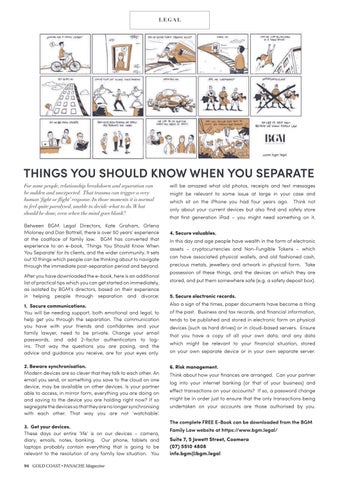LEGAL
THINGS YOU SHOULD KNOW WHEN YOU SEPARATE For some people, relationship breakdown and separation can be sudden and unexpected. That trauma can trigger a very human ‘fight or flight’ response. In those moments it is normal to feel quite paralysed, unable to decide what to do. What should be done, even when the mind goes blank? Between BGM Legal Directors, Kate Graham, Orlena Moloney and Dan Bottrell, there is over 50 years’ experience at the coalface of family law. BGM has converted that experience to an e-book, ‘Things You Should Know When You Separate’ for its clients, and the wider community. It sets out 10 things which people can be thinking about to navigate through the immediate post-separation period and beyond. After you have downloaded the e-book, here is an additional list of practical tips which you can get started on immediately, as isolated by BGM’s directors, based on their experience in helping people through separation and divorce:
will be amazed what old photos, receipts and text messages might be relevant to some issue at large in your case and which sit on the iPhone you had four years ago.
Think not
only about your current devices but also find and safely store that first generation iPad – you might need something on it. 4. Secure valuables. In this day and age people have wealth in the form of electronic assets – cryptocurrencies and Non-Fungible Tokens – which can have associated physical wallets, and old fashioned cash, precious metals, jewellery and artwork in physical form. Take possession of these things, and the devices on which they are stored, and put them somewhere safe (e.g. a safety deposit box). 5. Secure electronic records.
1. Secure communications. You will be needing support, both emotional and legal, to help get you through the separation. The communication you have with your friends and confidantes and your family lawyer, need to be private. Change your email passwords, and add 2-factor authenticators to logins. That way the questions you are posing, and the advice and guidance you receive, are for your eyes only.
Also a sign of the times, paper documents have become a thing
2. Beware synchronisation. Modern devices are so clever that they talk to each other. An email you send, or something you save to the cloud on one device, may be available on other devices. Is your partner able to access, in mirror form, everything you are doing on and saving to the device you are holding right now? If so segregate the devices so that they are no longer synchronising with each other. That way you are not ‘watchable’.
6. Risk management.
3. Get your devices. These days our entire ‘life’ is on our devices – camera, diary, emails, notes, banking. Our phone, tablets and laptops probably contain everything that is going to be relevant to the resolution of any family law situation. You 94 GOLD COAST • PANACHE Magazine
of the past. Business and tax records, and financial information, tends to be published and stored in electronic form on physical devices (such as hard drives) or in cloud-based servers. Ensure that you have a copy of all your own data, and any data which might be relevant to your financial situation, stored on your own separate device or in your own separate server.
Think about how your finances are arranged. Can your partner log into your internet banking (or that of your business) and effect transactions on your accounts? If so, a password change might be in order just to ensure that the only transactions being undertaken on your accounts are those authorised by you. The complete FREE E-Book can be downloaded from the BGM Family Law website at https://www.bgm.legal/
Suite 7, 5 Jowett Street, Coomera (07) 5510 4808 info.bgm@bgm.legal




























